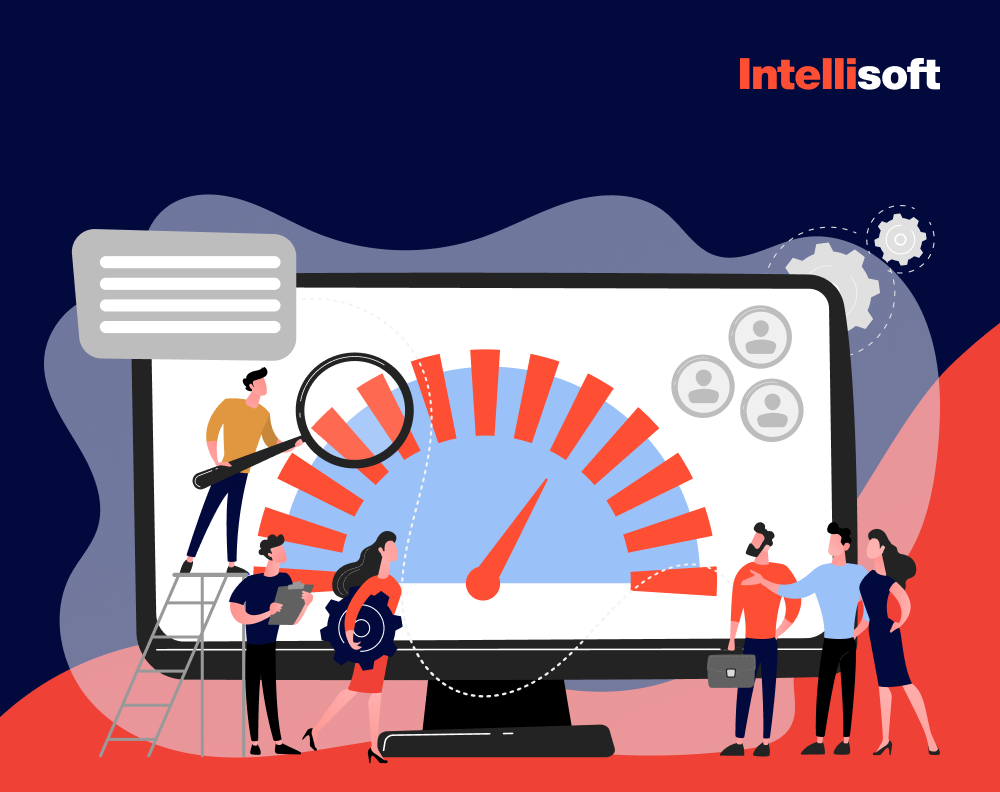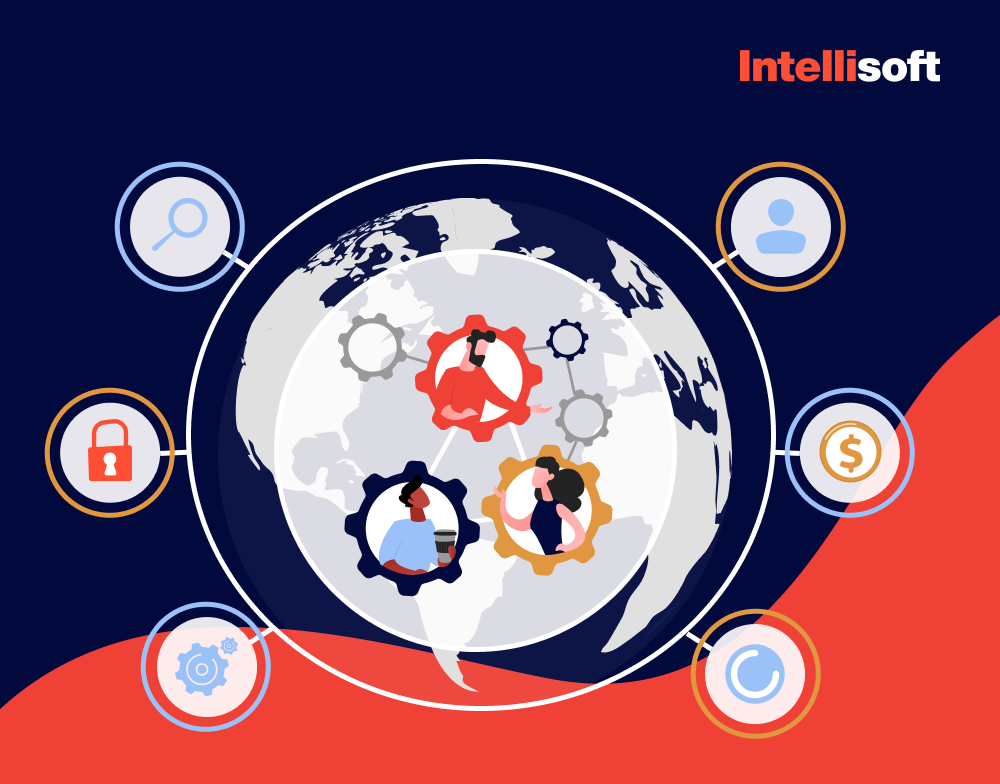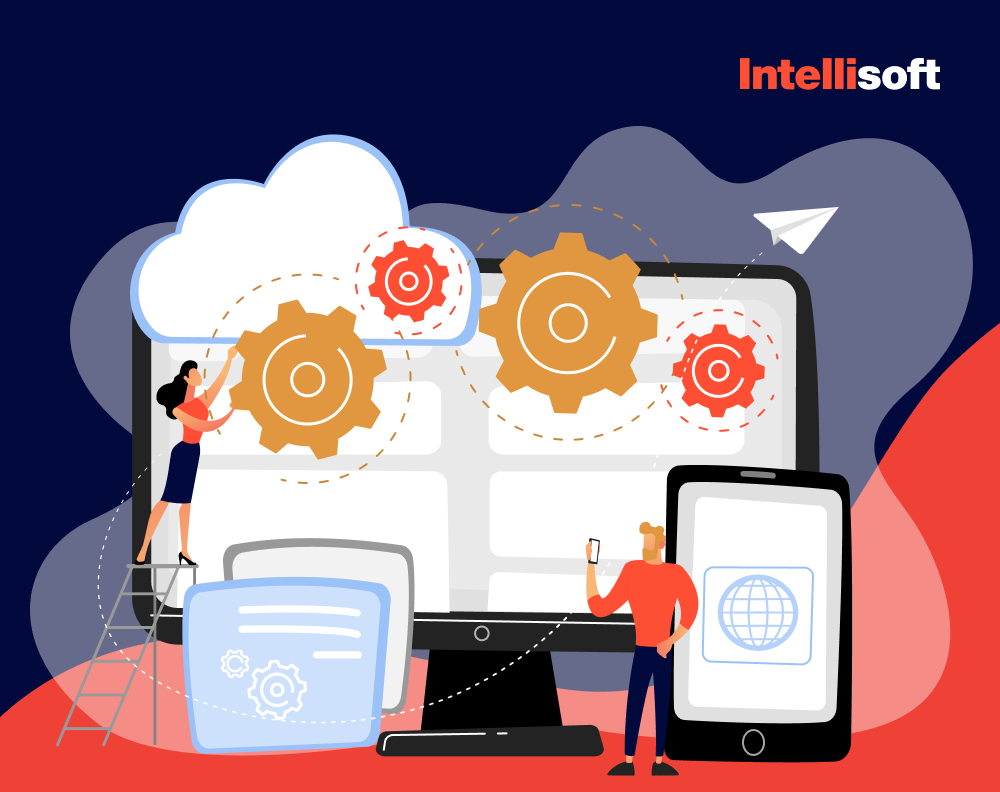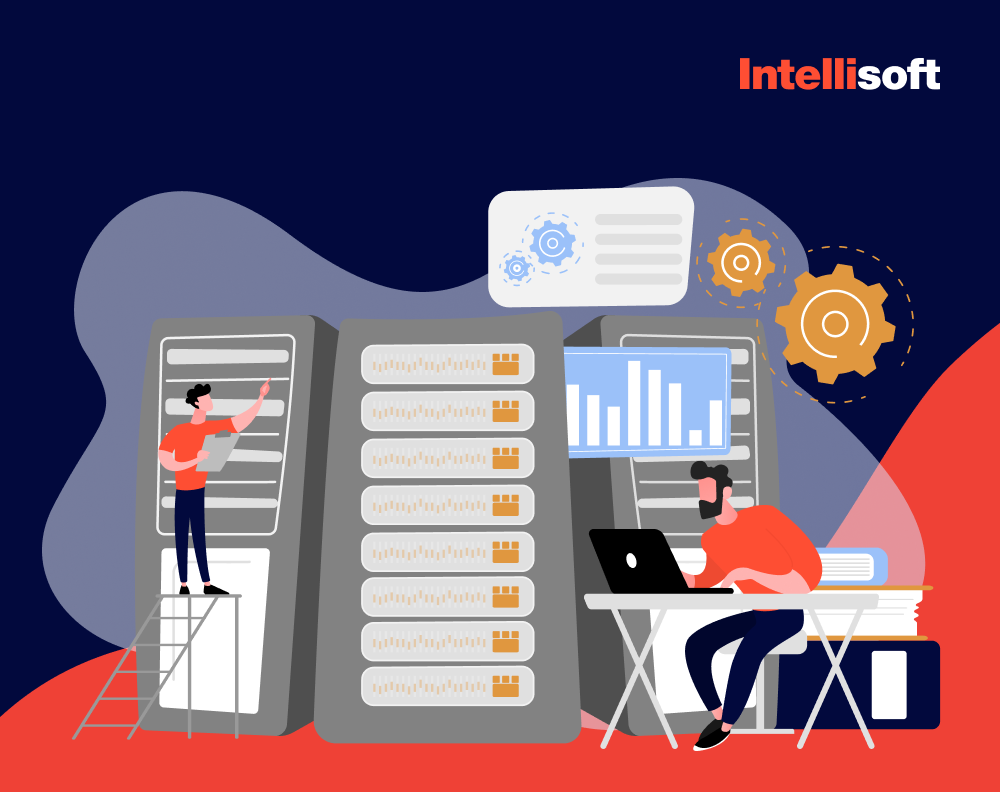Imagine you’re building a house. You have the blueprint, the vision, and a deadline. But what if you lacked the right tools or skilled labor to finish on time?
Instead of halting construction, you’d hire a trusted contractor. This is precisely the situation many businesses face when it comes to software development. They have ideas but lack the in-house expertise, resources, or bandwidth to bring them to life.
That’s where software development outsourcing comes in – a practical solution to fast-track development without compromising on quality.
However, outsourcing software development services isn’t without its challenges. From language barriers to time zone differences and maintaining control over the project, businesses often grapple with finding the right balance between cost and value.
Yet, the potential rewards are undeniable. According to software development outsourcing statistics by Fortunly, the global IT outsourcing market is projected to grow by $98 billion from 2020 to 2024, reflecting how many companies are leveraging external expertise to stay competitive. As Larry Ellison, Co-founder of Oracle, said, “When you outsource, you want to do it right because it’s not just about reducing costs, it’s about enhancing your overall operations.”
IntelliSoft, a software development outsourcing company, has 15+ years of experience in software development outsourcing, making navigating these complexities much simpler. Our approach ensures your project stays on track while you focus on what matters most – growing your business. Now, let’s move on to the software development outsourcing guide.
Table of Contents
Why Outsource Software Development?
Businesses often face a critical decision: Should they manage development in-house or outsource to specialists? What is software development outsourcing and why do it?
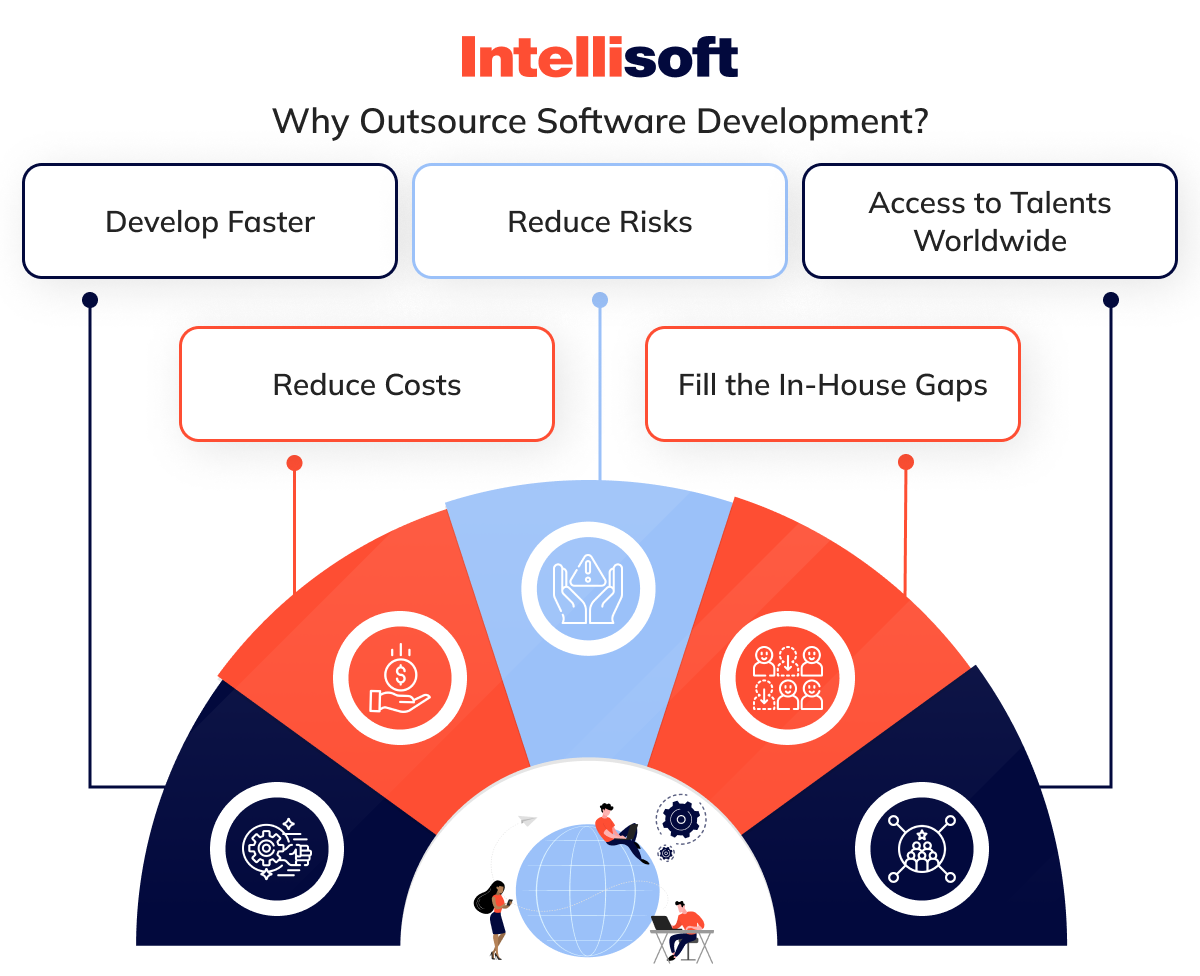
Software development outsourcing has quickly become a go-to strategy for companies that want to grow, innovate, and remain agile without spreading themselves too thin. Let’s break down why this approach is gaining traction and why more and more companies are choosing between software development in house vs outsourcing.
Develop Faster
Imagine trying to build a high-speed car in your garage with limited parts and just a handful of people. It would take ages, right?
Outsourcing software development services works like hiring a specialized pit crew – they have the tools, skills, and experience to get things moving fast. External software development teams can start your project quickly, scaling up when necessary and accelerating the overall process.
With dedicated software development outsourcing professionals handling your development, you can expect quicker turnarounds and fewer bottlenecks.
For example, companies like Slack outsourced their app development to software development outsourcing companies early on, which allowed them to go from concept to launch faster than if they had hired an in-house team.
Reduce Costs
The financial benefits of outsourcing software development are hard to ignore. Think of it like renting a high-performance car for a race rather than buying one outright – you get the same performance without the long-term investment. Hiring and maintaining an in-house team, including salaries, benefits, and training, can weigh heavily on your budget.
Software development outsourcing services, on the other hand, lets you tap into a global talent pool at a fraction of the cost. According to Deloitte, 70% of companies cite cost reduction as their primary reason for outsourcing IT functions. You’re essentially paying for only what you need when you need it, with no long-term overhead to worry about.
Reduce Risks
Every project comes with its fair share of risks, whether it’s missing deadlines, running over budget, or encountering technical challenges. Outsourcing software development helps mitigate these risks by transferring some of the responsibility to the experts.
A well-established software development provider has experience managing different kinds of projects, which means they can anticipate issues before they arise. This makes the development process smoother and less prone to costly setbacks.
Furthermore, trusted outsourcing companies will provide SLAs (Service Level Agreements) that guarantee delivery timelines and performance, giving you peace of mind.
Fill the In-House Gaps
Even if you have an in-house team, you might not have the right expertise for every project. It’s like having a great chef but needing a pastry expert for a special dessert; you need specific skills to succeed in your software development projects available for outsourcing.
Software development outsourcing services let you fill those skill gaps without overloading your existing team. Whether you’re working on a mobile app, an AI solution, or a complex web platform, outsourcing gives you access to specialized expertise that may not be available internally.
This model ensures your in-house team stays focused on core business activities while outside specialists handle the rest.
Access to Talents Worldwide
Geography is no longer a barrier to finding top talent. Custom software development outsourcing provides you with access to a global network of highly skilled developers. Whether you need a team in Eastern Europe, where software development expertise is growing rapidly, or developers from Asia who offer cost-effective solutions, the possibilities are endless.
According to Statista, global IT outsourcing has become an increasingly popular option, with over 65% of companies planning to continue or increase outsourcing in the future. This broad access means you can cherry-pick the best talent for your specific project, ensuring high-quality results every time.
The 3 Main Types of Software Outsourcing
When outsourcing software development for startups, choosing the right outsourcing model is key. Each type comes with its own set of benefits and challenges, often tied to factors like geography, time zones, and cultural alignment. Here’s a breakdown of the three main types of outsourcing – onshore, nearshore, and offshore – along with real-world examples to illustrate their differences.
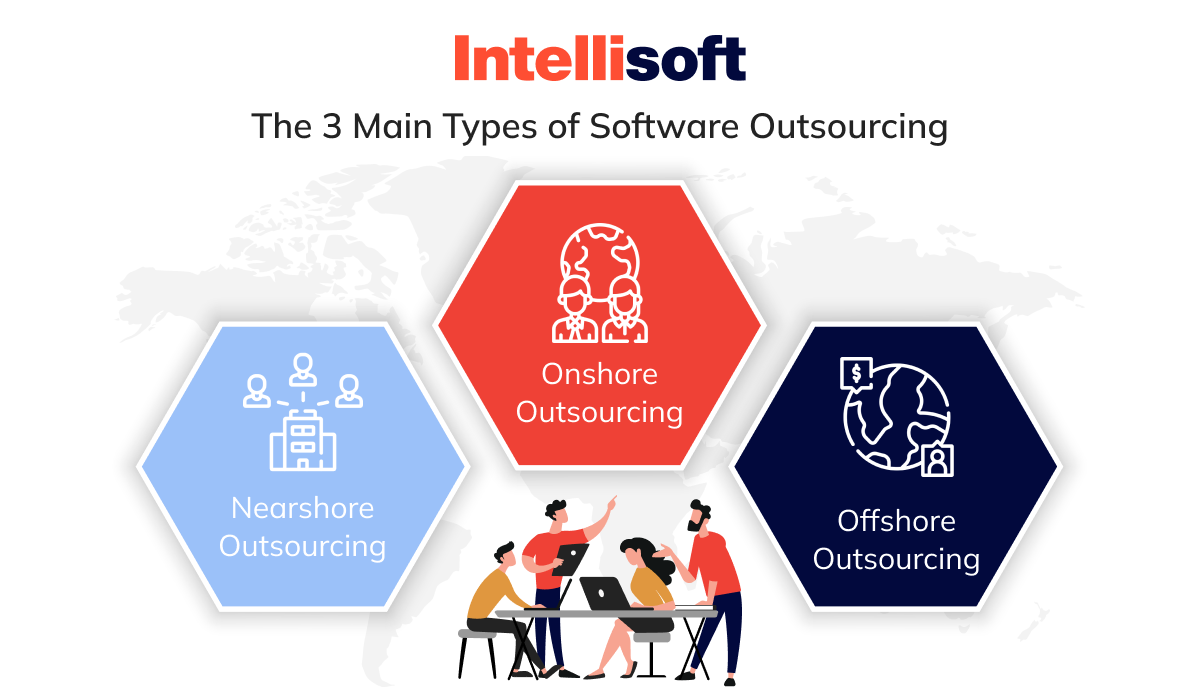
Nearshore Outsourcing
Nearshore software development outsourcing involves partnering with development teams in nearby countries, usually within a few hours’ time difference. Software development outsourcing nearshore balances cost savings with ease of communication. Take a US-based company outsourcing to a team in Mexico or Canada; the proximity ensures better alignment on working hours, similar cultural understandings, and relatively seamless communication.
Nearshore software outsourcing development is often chosen by companies who want to minimize the challenges of offshore outsourcing while still benefiting from cost reductions. For instance, many European companies choose Eastern Europe software development outsourcing – countries like Poland or Ukraine – where the quality of talent is high, and collaboration remains relatively simple due to similar time zones.
Now, let’s look at the alternatives to nearshore software development outsourcing.
Onshore Outsourcing
Onshore outsourcing involves hiring an outsourcing software development company from the same country as your business. Think of it as working with a local partner who understands your language, culture, and business environment.
For example, a tech company based in San Francisco may outsource its software development to a team in New York. While the costs might be higher than other models, the advantages include minimal time zone differences and easier collaboration. Communication is often smoother, and there’s less chance of misunderstandings.
Onshore outsourcing software development projects is ideal when you need real-time collaboration or have complex projects that require close oversight. For example, businesses in the US often choose onshore outsourcing when they need full control over the development process without the complications of international coordination.
Offshore Outsourcing
Offshore software development outsourcing refers to working with teams in distant countries, typically in regions with significant cost advantages. An example of offshore outsourcing is a UK-based business hiring developers from India or the Philippines with lower labor costs. An offshore outsourcing software development company can provide substantial savings, making it a popular choice for companies with tight budgets or large-scale projects that need round-the-clock development.
While offshore outsourcing software development companies can lead to challenges, such as managing time zone differences or communication gaps, it’s a highly efficient model when cost is a primary concern. An offshore software development outsourcing company often specializes in various aspects of software development, offering flexibility and expertise across different technology stacks. With proper coordination, this model can be highly effective for businesses aiming to maximize resources without sacrificing quality.
Software Outsourcing Models
Choosing the right outsourcing of software development model is as important as deciding to outsource in the first place. Here are three popular software outsourcing models that companies frequently opt for; the project-based model, the dedicated team model, and the outstaffing model. Let’s break down how they work and when they make sense.
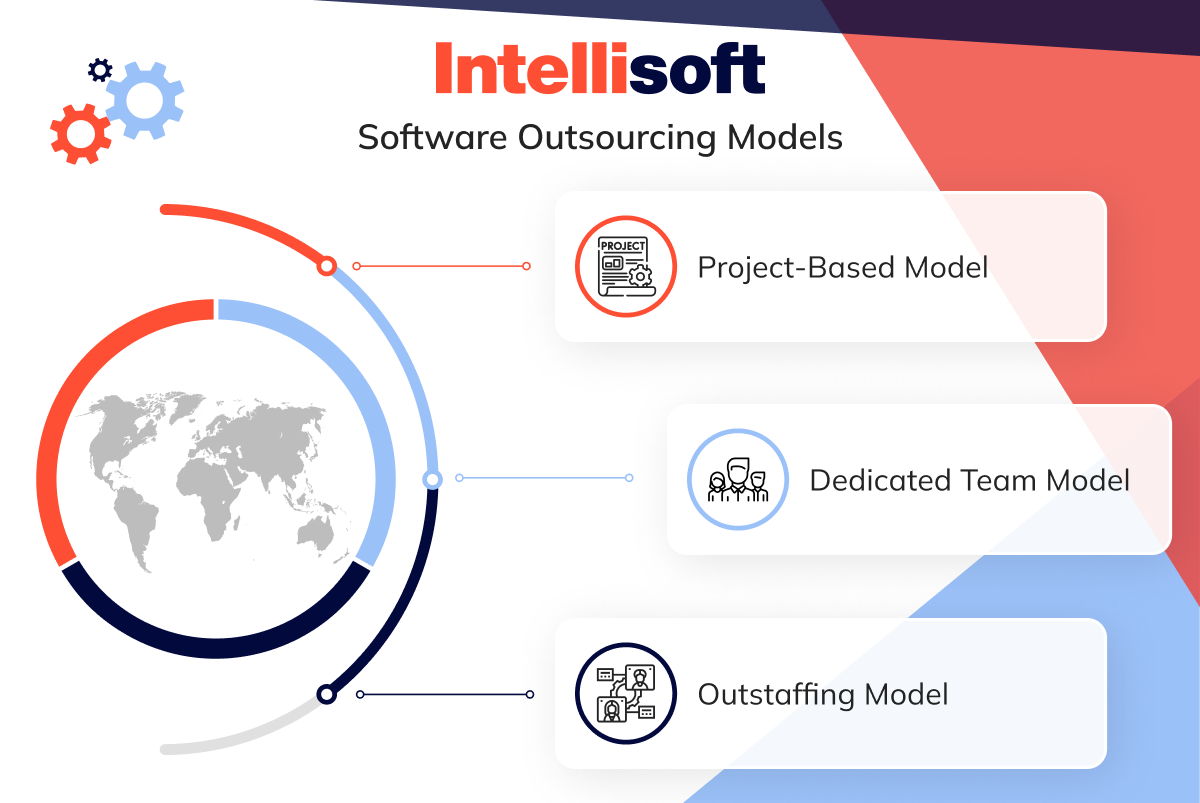
Project-Based Model
Imagine you have a vision for a new product but don’t have the internal resources to bring it to life. The project-based model is like hiring a full-service agency to handle everything from concept to delivery. You provide the blueprint, and the outsourcing team executes the plan, ensuring the final product meets your expectations.
This software product development outsourcing model works best for well-defined projects with clear goals and timelines. For example, if you need a custom e-commerce platform, you can opt for Java software development outsourcing. Once the project is complete, you’re handed the keys to your new digital storefront, ready for business. However, it’s essential to have detailed specifications upfront to avoid scope changes that could impact timelines and costs.
Dedicated Team Model
Outsourcing software development to dedicated team is a bit like hiring your own pit crew – they’re focused solely on your race. In this scenario, you bring in an entire development team that works exclusively on your project, though they remain employees of the outsourcing provider.
Agile software development outsourcing is the best option when your project requires continuous work over time, like building and maintaining a platform or developing software that will evolve regularly.
A growing startup might need a dedicated team to keep up with constant feature updates and product iterations. With embedded software development outsourcing, you retain full control over the team’s daily tasks while benefiting from the convenience of not handling HR logistics, like salaries or vacation days.
Outstaffing Model
The outstaffing model is like adding extra players to your team when you need them most. Whether you’re facing a tight deadline or require specific expertise, this type of outsourcing custom software development allows you to bring in external talent who work directly with your in-house team, following your processes and tools.
For instance, imagine you’re developing an advanced AI feature but lack the in-house specialists. By outstaffing, you can temporarily hire AI experts to join your team and contribute to the project, all while maintaining control over their tasks and integration. It’s a flexible, cost-effective solution that helps you scale your team without long-term commitments or the headaches of traditional hiring.
Related Readings:
- Outsourcing vs Offshoring: Discover Which Model Maximizes Efficiency?
- Best Countries To Outsource Software Development
- Hire Developers for Startup: Key Strategies for Success
- Everything You Need to Know About Team Extension and Dedicated Team Models
- Outsourcing vs. Outstaffing Models: What Is the Difference and Their Pros & Cons
How to Find a Software Outsourcing Company?
Finding the right outsourcing partner is like searching for the perfect co-pilot – you want someone who understands your vision, matches your pace, and can guide you smoothly through the turbulence. That’s how you’ll experience all the advantages of outsourcing software development. But with so many options out there, how do you choose the right one?
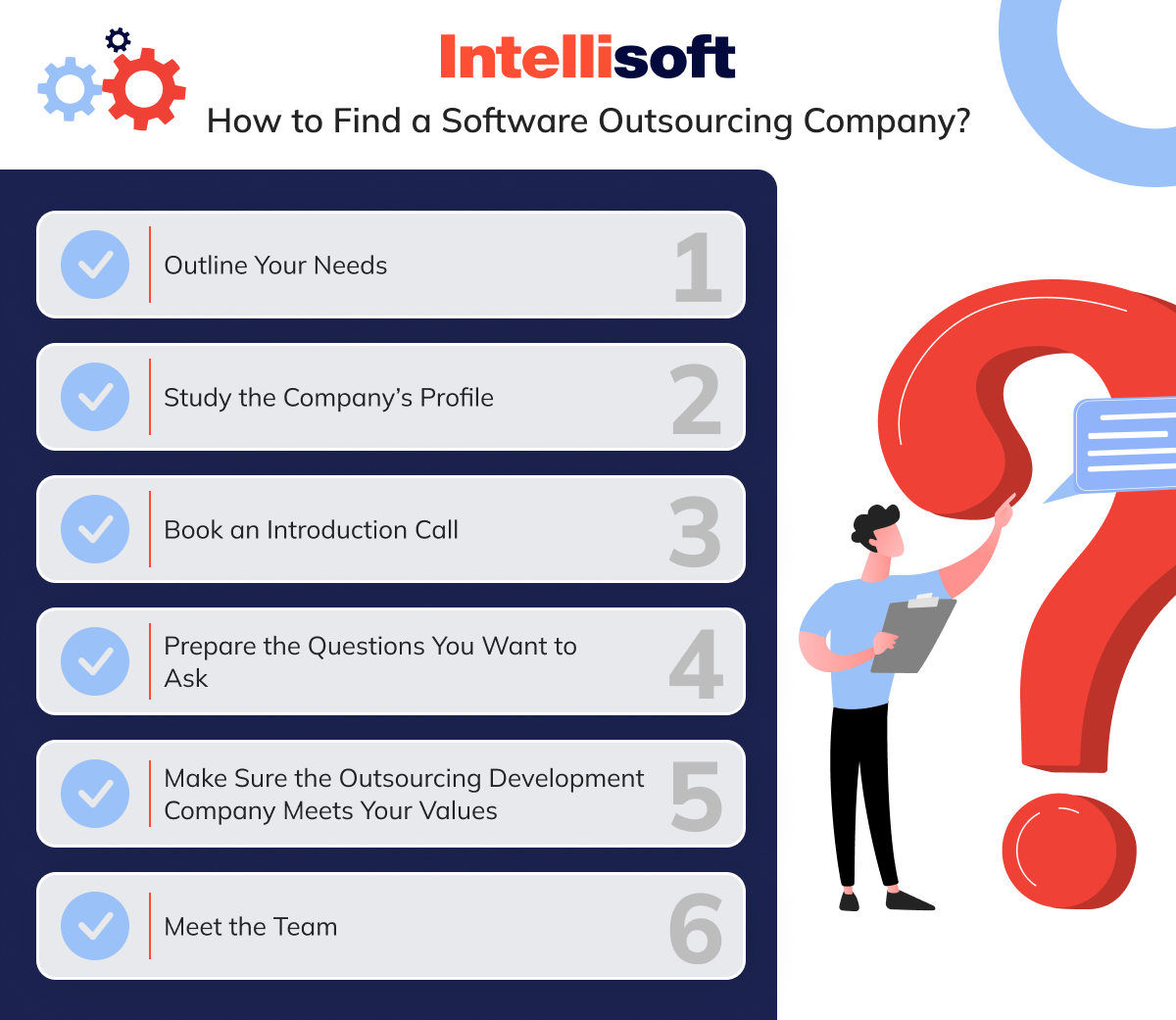
Outline Your Needs
Before you start your search, it’s essential to know what you’re looking for. Think of it like heading to the grocery store – you wouldn’t go without a list, right?
The same goes for inhouse software development vs outsourcing. Start by outlining your specific needs, whether it’s developing an app, scaling an existing platform, or integrating AI solutions. Do you need ongoing support, or is it a one-time project? Getting clear on your requirements helps narrow down your options and ensures you find a company with the right expertise.
Study the Company’s Profile
Now that you have your list, it’s time to do your homework. Look beyond flashy websites and dive into the company’s portfolio, case studies, and client reviews. It’s like reading restaurant reviews before dining out – you want to make sure the company has a solid track record. Check their experience in your industry, review past projects, and see if they’ve handled challenges similar to yours. For example, if you’re in fintech, does the company have experience in secure, compliant software development?
Don’t forget to review their reputation on platforms like Clutch or GoodFirms. These profiles often highlight strengths, weaknesses, and real client feedback, helping you get a more realistic sense of what working with them might be like.
Book an Introduction Call
Once you’ve done your research, it’s time to get personal. Booking an introductory call is like meeting someone for a coffee date before committing to anything serious. This is your chance to feel out the company’s culture, communication style, and overall vibe. How do they handle your inquiries? Are they transparent and eager to understand your vision, or are they too pushy and sales-driven?
A good outsourcing software product development partner should be genuinely interested in helping you succeed, not just closing a deal. Pay attention to how well they listen to your needs and offer thoughtful solutions rather than generic sales pitches.
Prepare the Questions You Want to Ask
Before the call, come equipped with a list of specific questions. It’s like interviewing a potential team member – asking the right questions can reveal a lot about how they work. For instance, ask about their development process, how they handle unforeseen issues, or what their communication cadence will be. Will they provide regular updates, or will you have to chase them down for progress reports? These questions can save you a lot of headaches later by ensuring you and your software development projects outsourcing partner are on the same page from day one.
Make Sure the Outsourcing Development Company Meets Your Values
A company’s technical prowess is only part of the equation. It’s also crucial that their values align with yours. This is like finding a workout buddy – you want someone who motivates and supports you, not someone who slacks off or conflicts with your principles.
If transparency, integrity, or innovation is at the core of your company’s culture, make sure your outsourcing partner operates in the same way. You don’t want a company that cuts corners or doesn’t prioritize open communication.
You can ask about their policies on data security, sustainability, or how they support employee well-being – any values that are important to your business should be mirrored in theirs.
Meet the Team
Finally, meet the people who’ll be working on your project and sign the software development outsourcing contract. After all, it’s the individuals who will bring your vision to life. This step is like meeting your future teammates before a big game – do they have the energy, enthusiasm, and experience you’re looking for? Meeting the team allows you to assess their expertise, get a feel for their collaborative spirit, and understand whether they’ll be a good fit for your project’s unique requirements.
Are they proactive in offering suggestions? Do they communicate clearly? Building a strong rapport with the team is vital for long-term success, especially if you’ll be working closely over the course of months or years.
How to Choose a Development Partner: Small vs. Large Outsourcing Companies
When choosing a partner for outsourcing development software, one of the first decisions you’ll face is whether to go with a small, nimble team or a larger, more established firm. It’s kind of like deciding whether to dine at a cozy family-owned restaurant or a well-known chain.
Each has its own advantages and disadvantages of outsourcing software development, and the right choice depends on your project’s specific needs, budget, and long-term vision.
Flexibility vs. Structure
Smaller software development project outsourcing companies often provide a more flexible, personalized approach. You get direct access to key decision-makers, and the communication lines are typically shorter and more transparent. This flexibility can be a game-changer if you need a more customized development process or expect a lot of pivots along the way.
On the flip side, larger firms offer more structure, with well-established processes and resources. If your project is highly complex or you need a large team to scale quickly, a bigger company might have the bandwidth and specialized departments to get the job done efficiently.
Attention vs. Resources
Smaller firms tend to treat every client like a VIP. This is great if you want hands-on support and a close partnership. You’ll likely get to know the developers working on your project and have more influence over their daily work.
In contrast, a larger outsourcing software development agency has the advantage of vast resources. They can handle multiple projects simultaneously, and if your project requires cutting-edge technologies or a variety of specialists, a larger outsourcing company will likely have them on hand. However, the attention you get might feel more spread out, as your project becomes one of many in their pipeline.
Agility vs. Reliability
A smaller IT outsourcing software development company is often more agile, meaning they can adapt to changes quickly. If your project is evolving, or you anticipate the need for rapid changes, a small team can shift gears without the red tape that often comes with larger organizations.
That said, larger companies have more resources to ensure reliability. They likely have established contingency plans and redundant systems to ensure your project stays on track, even if unforeseen issues arise. If your priority is stability and long-term support, a bigger company might give you that peace of mind.
Innovation vs. Proven Experience
Smaller outsourcing firms, especially startups, often bring fresh perspectives and a hunger for innovation.
However, if you’re looking for proven experience and industry expertise, larger companies often have a more impressive track record. They’ve likely worked with clients across multiple sectors and can provide tried-and-tested solutions for your challenges.
Cost vs. Scalability
Budget is often a deciding factor when choosing between small and large outsourcing companies and in-house software development vs outsourcing. If you’re working on a smaller-scale project and need to maximize ROI, a smaller partner could be a smart choice.
On the other hand, if scalability is your goal, larger firms are equipped to scale up (or down) quickly. They can ramp up their teams and allocate more resources as your project grows, making them a better fit for larger, more complex, or long-term projects.
The Cost of Outsourcing Software Development
Here’s are the approximate outsourcing software development costs:
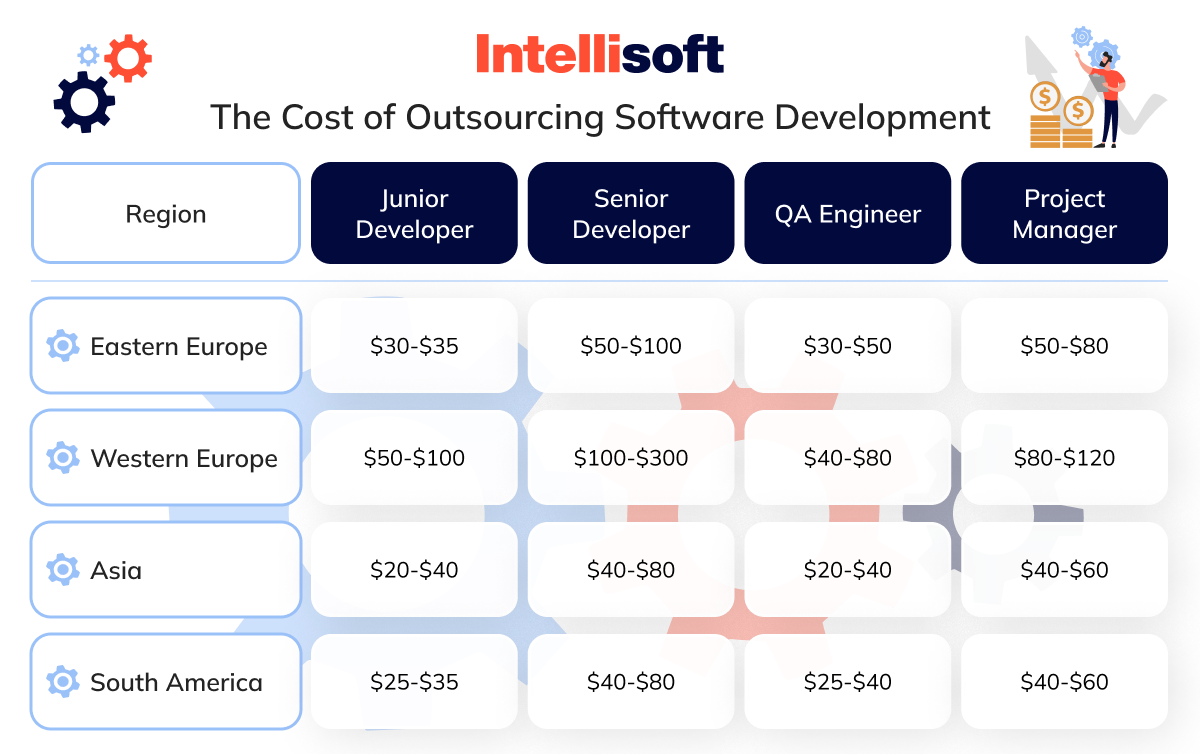
Outsourcing Software Development with IntelliSoft: Daintel’s Story
Imagine you’re in charge of creating software that hospitals depend on for life-saving decisions. The pressure is immense – your platform needs to seamlessly gather data from medical devices in the ICU, NICU, and surgical units, and it must work flawlessly across departments.
This was Daintel’s reality, a Danish healthcare software company with a mission to improve patient care through cutting-edge clinical IT solutions. But even with their expertise, they needed a partner to help scale their vision with healthcare software development outsourcing. That’s where our IntelliSoft software development outsourcing company came in, and the results were nothing short of transformative.
With IntelliSoft’s outsourcing software development Ukraine, Daintel didn’t just enhance its software; it leveled up. By tapping into our pool of talented developers, Daintel ensured its platform was built with precision, speed, and the latest technology. This outsourcing medical software development wasn’t just about hitting deadlines – it was about creating a tool that could genuinely improve patient outcomes.
The partnership paid off big time. The improvements made to Daintel’s system caught the attention of Cambio Healthcare Systems, a major player in electronic patient records. Cambio recognized the platform’s potential and, as a result, acquired Daintel, incorporating its advanced solutions into their own. IntelliSoft’s role in this journey was pivotal, showing how the right outsourcing software and product development company can drive both innovation and business growth.
Wrapping Up
Outsourcing software development isn’t just about saving time or cutting costs – it’s about unlocking the full potential of your business. It gives you access to a world of talent, helps you bring ideas to life faster, and reduces the risks that come with scaling projects.
Whether you’re looking to fill expertise gaps, speed up development, or ensure your solution is future-ready, outsourcing can provide the flexibility and innovation your business needs to thrive.
With the right partner, you’re not just building software – you’re building the future of your company. Ready to take that leap? Reach out to IntelliSoft today, and let’s create something amazing together.


